QUT LWS101: Ethical and Legal Decision Making in Healthcare Case Study
VerifiedAdded on 2022/11/13
|11
|2291
|347
Case Study
AI Summary
This case study examines the legal and ethical decision-making processes in a healthcare setting, focusing on a patient, Valentina Dawson, a Jehovah's Witness who refuses blood transfusions. The assignment analyzes the roles of various individuals, including the patient, family members, nurses, and doctors, in navigating this complex situation. It evaluates the ethical principles of autonomy, beneficence, non-maleficence, and justice, as well as relevant codes of ethics, such as the ICN Code of Ethics and the NMBA Code of Conduct. The study also explores legal issues, including the Mental Health Act 2016 and the Power of Attorney Act 1998, in relation to the patient's capacity to make decisions. The analysis considers the implications of the patient's religious beliefs and the medical team's responsibilities in respecting those beliefs while providing necessary care. The case study highlights the challenges in balancing patient rights, medical obligations, and legal requirements, particularly in emergency situations where blood transfusions are critical. The conclusion emphasizes the importance of respecting patient autonomy, adhering to ethical guidelines, and considering all possible medical alternatives while navigating the legal and ethical complexities of such cases.
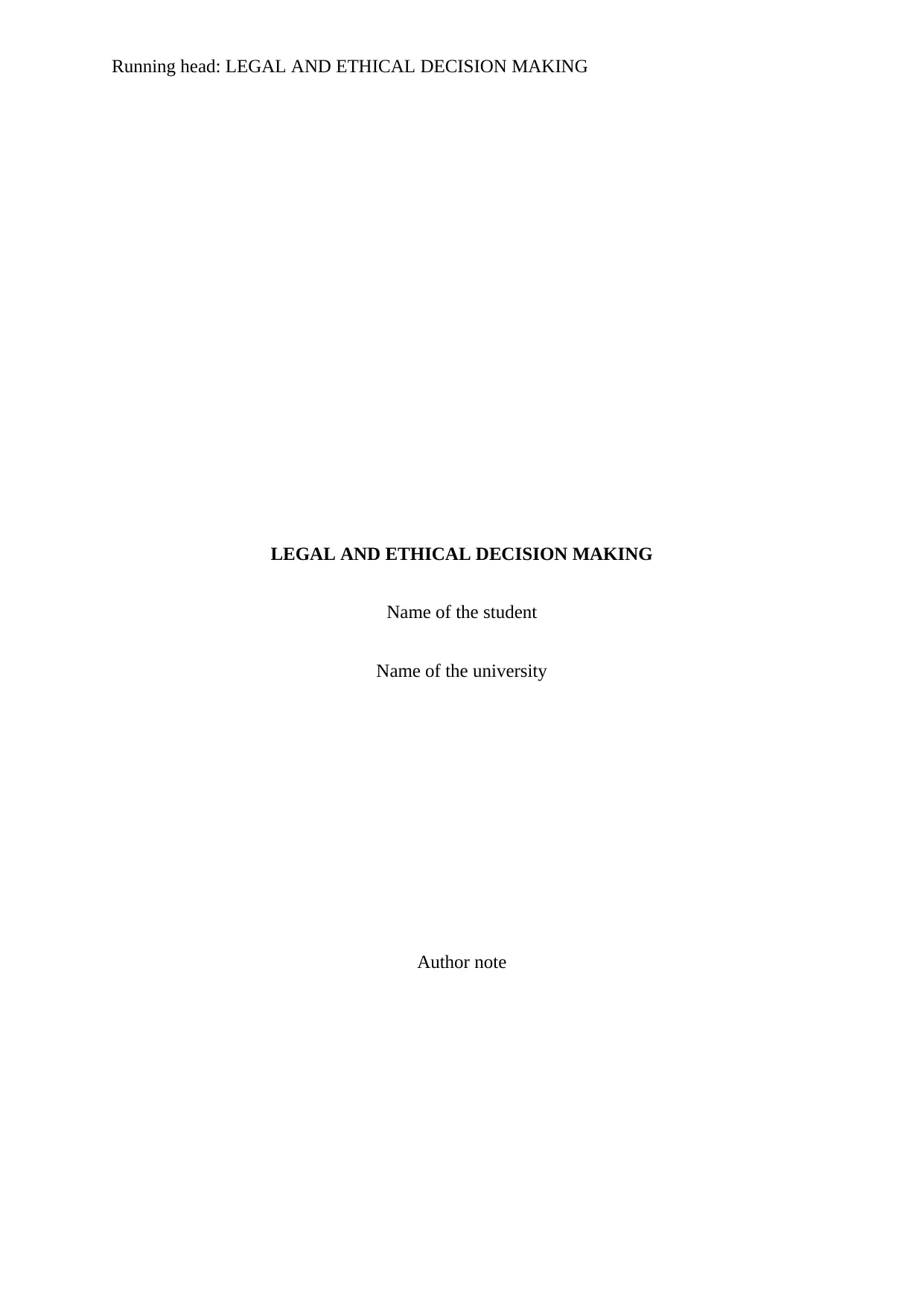
Running head: LEGAL AND ETHICAL DECISION MAKING
LEGAL AND ETHICAL DECISION MAKING
Name of the student
Name of the university
Author note
LEGAL AND ETHICAL DECISION MAKING
Name of the student
Name of the university
Author note
Paraphrase This Document
Need a fresh take? Get an instant paraphrase of this document with our AI Paraphraser
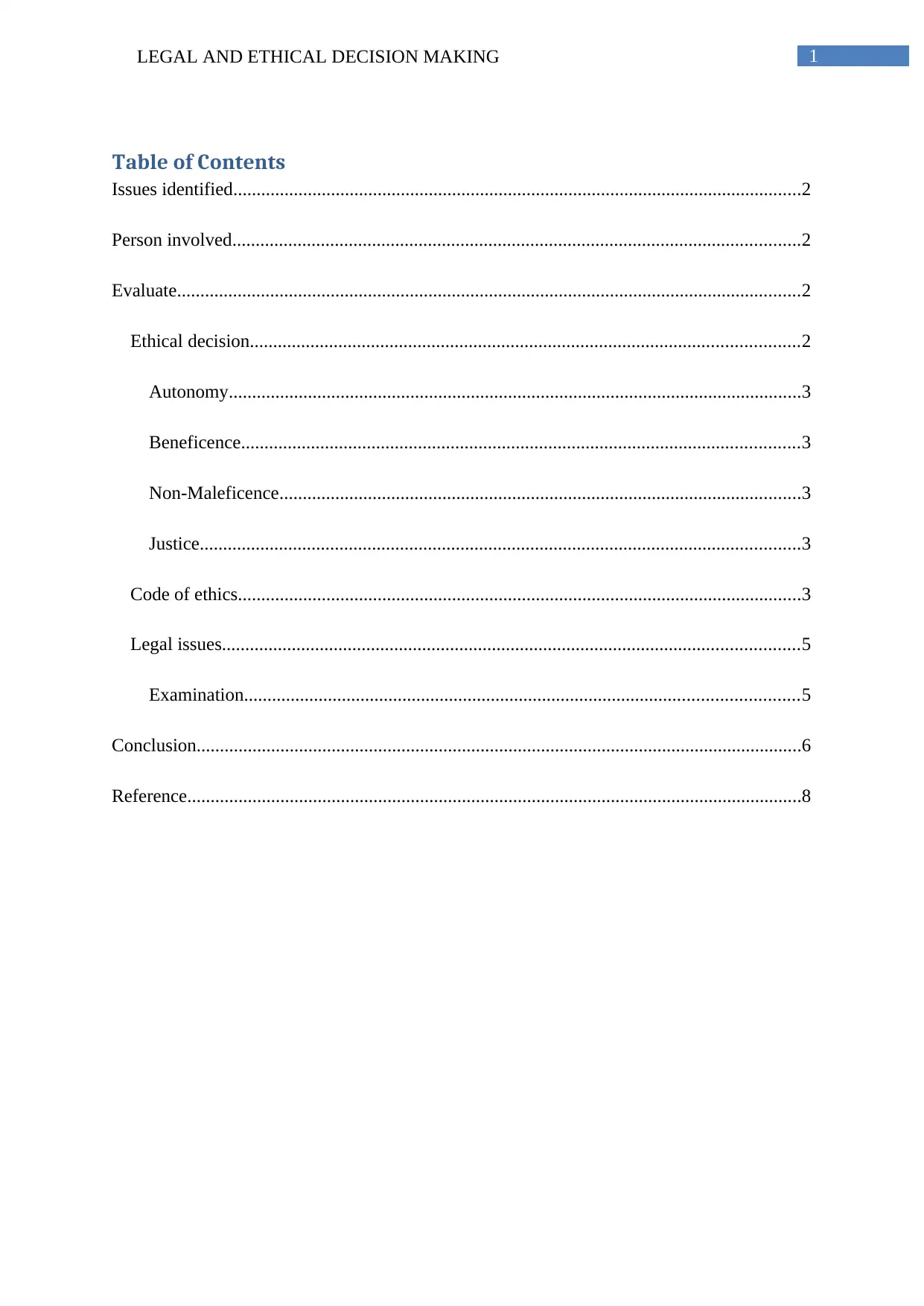
1LEGAL AND ETHICAL DECISION MAKING
Table of Contents
Issues identified..........................................................................................................................2
Person involved..........................................................................................................................2
Evaluate......................................................................................................................................2
Ethical decision......................................................................................................................2
Autonomy...........................................................................................................................3
Beneficence........................................................................................................................3
Non-Maleficence................................................................................................................3
Justice.................................................................................................................................3
Code of ethics.........................................................................................................................3
Legal issues............................................................................................................................5
Examination.......................................................................................................................5
Conclusion..................................................................................................................................6
Reference....................................................................................................................................8
Table of Contents
Issues identified..........................................................................................................................2
Person involved..........................................................................................................................2
Evaluate......................................................................................................................................2
Ethical decision......................................................................................................................2
Autonomy...........................................................................................................................3
Beneficence........................................................................................................................3
Non-Maleficence................................................................................................................3
Justice.................................................................................................................................3
Code of ethics.........................................................................................................................3
Legal issues............................................................................................................................5
Examination.......................................................................................................................5
Conclusion..................................................................................................................................6
Reference....................................................................................................................................8
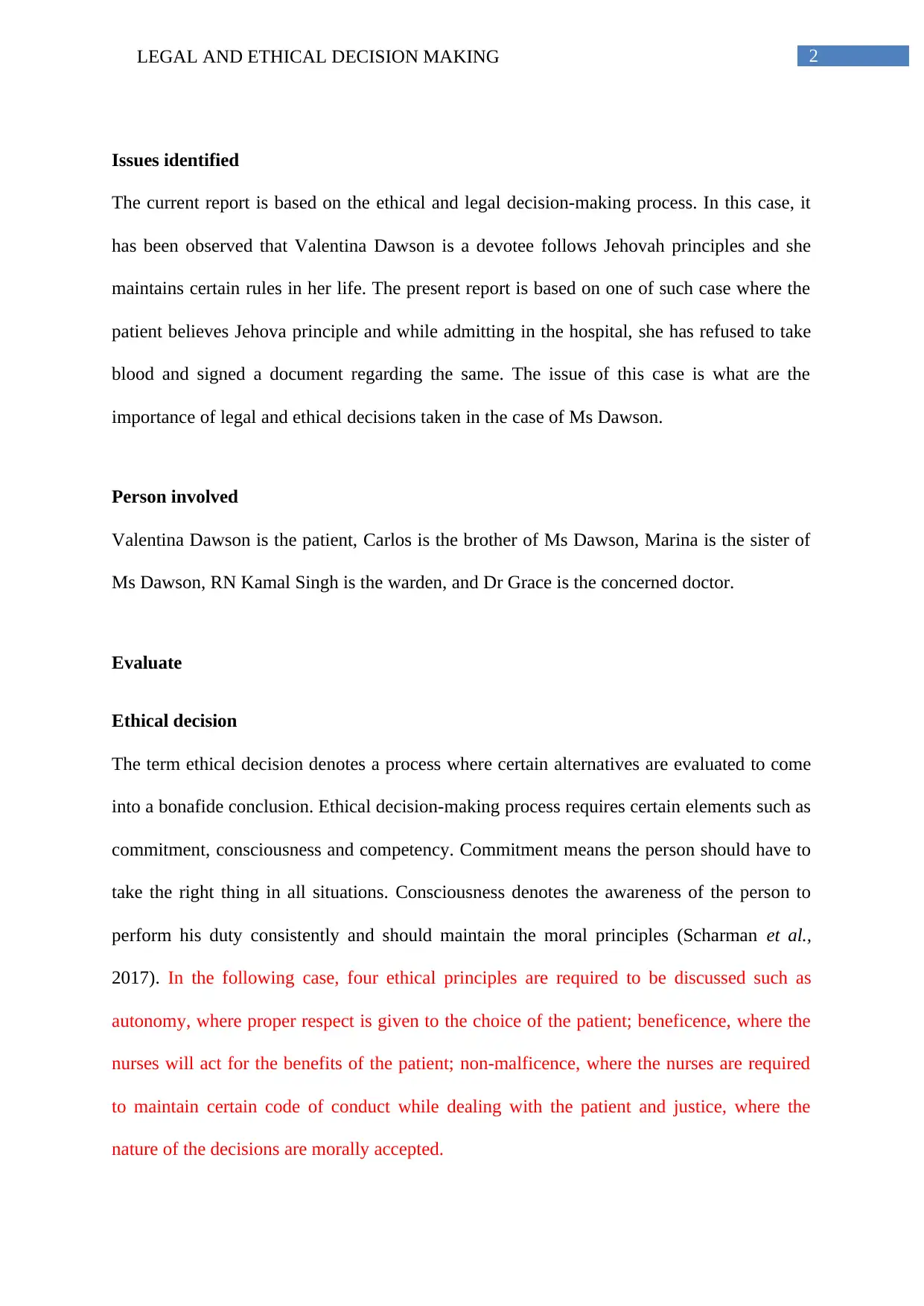
2LEGAL AND ETHICAL DECISION MAKING
Issues identified
The current report is based on the ethical and legal decision-making process. In this case, it
has been observed that Valentina Dawson is a devotee follows Jehovah principles and she
maintains certain rules in her life. The present report is based on one of such case where the
patient believes Jehova principle and while admitting in the hospital, she has refused to take
blood and signed a document regarding the same. The issue of this case is what are the
importance of legal and ethical decisions taken in the case of Ms Dawson.
Person involved
Valentina Dawson is the patient, Carlos is the brother of Ms Dawson, Marina is the sister of
Ms Dawson, RN Kamal Singh is the warden, and Dr Grace is the concerned doctor.
Evaluate
Ethical decision
The term ethical decision denotes a process where certain alternatives are evaluated to come
into a bonafide conclusion. Ethical decision-making process requires certain elements such as
commitment, consciousness and competency. Commitment means the person should have to
take the right thing in all situations. Consciousness denotes the awareness of the person to
perform his duty consistently and should maintain the moral principles (Scharman et al.,
2017). In the following case, four ethical principles are required to be discussed such as
autonomy, where proper respect is given to the choice of the patient; beneficence, where the
nurses will act for the benefits of the patient; non-malficence, where the nurses are required
to maintain certain code of conduct while dealing with the patient and justice, where the
nature of the decisions are morally accepted.
Issues identified
The current report is based on the ethical and legal decision-making process. In this case, it
has been observed that Valentina Dawson is a devotee follows Jehovah principles and she
maintains certain rules in her life. The present report is based on one of such case where the
patient believes Jehova principle and while admitting in the hospital, she has refused to take
blood and signed a document regarding the same. The issue of this case is what are the
importance of legal and ethical decisions taken in the case of Ms Dawson.
Person involved
Valentina Dawson is the patient, Carlos is the brother of Ms Dawson, Marina is the sister of
Ms Dawson, RN Kamal Singh is the warden, and Dr Grace is the concerned doctor.
Evaluate
Ethical decision
The term ethical decision denotes a process where certain alternatives are evaluated to come
into a bonafide conclusion. Ethical decision-making process requires certain elements such as
commitment, consciousness and competency. Commitment means the person should have to
take the right thing in all situations. Consciousness denotes the awareness of the person to
perform his duty consistently and should maintain the moral principles (Scharman et al.,
2017). In the following case, four ethical principles are required to be discussed such as
autonomy, where proper respect is given to the choice of the patient; beneficence, where the
nurses will act for the benefits of the patient; non-malficence, where the nurses are required
to maintain certain code of conduct while dealing with the patient and justice, where the
nature of the decisions are morally accepted.
⊘ This is a preview!⊘
Do you want full access?
Subscribe today to unlock all pages.

Trusted by 1+ million students worldwide
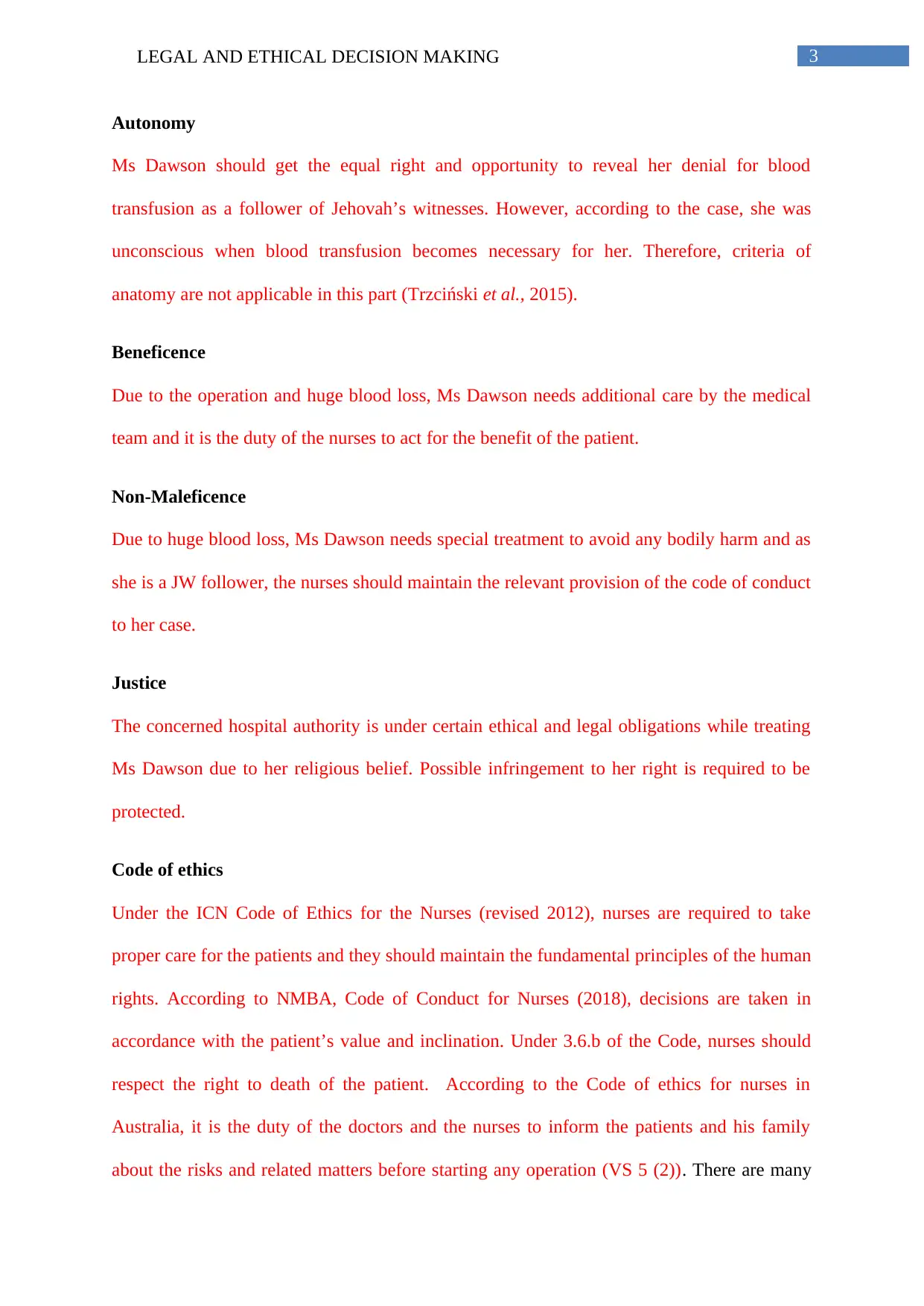
3LEGAL AND ETHICAL DECISION MAKING
Autonomy
Ms Dawson should get the equal right and opportunity to reveal her denial for blood
transfusion as a follower of Jehovah’s witnesses. However, according to the case, she was
unconscious when blood transfusion becomes necessary for her. Therefore, criteria of
anatomy are not applicable in this part (Trzciński et al., 2015).
Beneficence
Due to the operation and huge blood loss, Ms Dawson needs additional care by the medical
team and it is the duty of the nurses to act for the benefit of the patient.
Non-Maleficence
Due to huge blood loss, Ms Dawson needs special treatment to avoid any bodily harm and as
she is a JW follower, the nurses should maintain the relevant provision of the code of conduct
to her case.
Justice
The concerned hospital authority is under certain ethical and legal obligations while treating
Ms Dawson due to her religious belief. Possible infringement to her right is required to be
protected.
Code of ethics
Under the ICN Code of Ethics for the Nurses (revised 2012), nurses are required to take
proper care for the patients and they should maintain the fundamental principles of the human
rights. According to NMBA, Code of Conduct for Nurses (2018), decisions are taken in
accordance with the patient’s value and inclination. Under 3.6.b of the Code, nurses should
respect the right to death of the patient. According to the Code of ethics for nurses in
Australia, it is the duty of the doctors and the nurses to inform the patients and his family
about the risks and related matters before starting any operation (VS 5 (2)). There are many
Autonomy
Ms Dawson should get the equal right and opportunity to reveal her denial for blood
transfusion as a follower of Jehovah’s witnesses. However, according to the case, she was
unconscious when blood transfusion becomes necessary for her. Therefore, criteria of
anatomy are not applicable in this part (Trzciński et al., 2015).
Beneficence
Due to the operation and huge blood loss, Ms Dawson needs additional care by the medical
team and it is the duty of the nurses to act for the benefit of the patient.
Non-Maleficence
Due to huge blood loss, Ms Dawson needs special treatment to avoid any bodily harm and as
she is a JW follower, the nurses should maintain the relevant provision of the code of conduct
to her case.
Justice
The concerned hospital authority is under certain ethical and legal obligations while treating
Ms Dawson due to her religious belief. Possible infringement to her right is required to be
protected.
Code of ethics
Under the ICN Code of Ethics for the Nurses (revised 2012), nurses are required to take
proper care for the patients and they should maintain the fundamental principles of the human
rights. According to NMBA, Code of Conduct for Nurses (2018), decisions are taken in
accordance with the patient’s value and inclination. Under 3.6.b of the Code, nurses should
respect the right to death of the patient. According to the Code of ethics for nurses in
Australia, it is the duty of the doctors and the nurses to inform the patients and his family
about the risks and related matters before starting any operation (VS 5 (2)). There are many
Paraphrase This Document
Need a fresh take? Get an instant paraphrase of this document with our AI Paraphraser
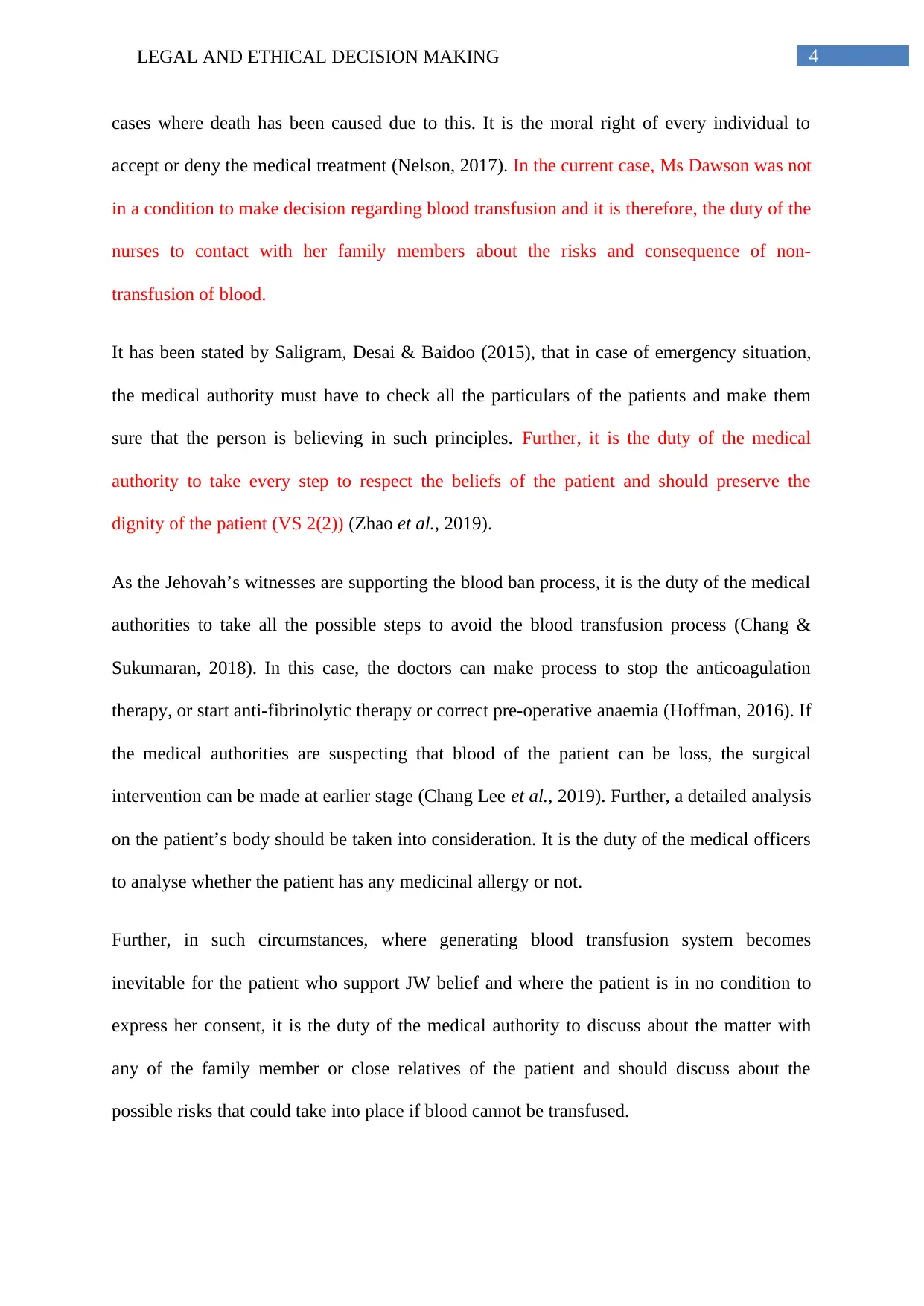
4LEGAL AND ETHICAL DECISION MAKING
cases where death has been caused due to this. It is the moral right of every individual to
accept or deny the medical treatment (Nelson, 2017). In the current case, Ms Dawson was not
in a condition to make decision regarding blood transfusion and it is therefore, the duty of the
nurses to contact with her family members about the risks and consequence of non-
transfusion of blood.
It has been stated by Saligram, Desai & Baidoo (2015), that in case of emergency situation,
the medical authority must have to check all the particulars of the patients and make them
sure that the person is believing in such principles. Further, it is the duty of the medical
authority to take every step to respect the beliefs of the patient and should preserve the
dignity of the patient (VS 2(2)) (Zhao et al., 2019).
As the Jehovah’s witnesses are supporting the blood ban process, it is the duty of the medical
authorities to take all the possible steps to avoid the blood transfusion process (Chang &
Sukumaran, 2018). In this case, the doctors can make process to stop the anticoagulation
therapy, or start anti-fibrinolytic therapy or correct pre-operative anaemia (Hoffman, 2016). If
the medical authorities are suspecting that blood of the patient can be loss, the surgical
intervention can be made at earlier stage (Chang Lee et al., 2019). Further, a detailed analysis
on the patient’s body should be taken into consideration. It is the duty of the medical officers
to analyse whether the patient has any medicinal allergy or not.
Further, in such circumstances, where generating blood transfusion system becomes
inevitable for the patient who support JW belief and where the patient is in no condition to
express her consent, it is the duty of the medical authority to discuss about the matter with
any of the family member or close relatives of the patient and should discuss about the
possible risks that could take into place if blood cannot be transfused.
cases where death has been caused due to this. It is the moral right of every individual to
accept or deny the medical treatment (Nelson, 2017). In the current case, Ms Dawson was not
in a condition to make decision regarding blood transfusion and it is therefore, the duty of the
nurses to contact with her family members about the risks and consequence of non-
transfusion of blood.
It has been stated by Saligram, Desai & Baidoo (2015), that in case of emergency situation,
the medical authority must have to check all the particulars of the patients and make them
sure that the person is believing in such principles. Further, it is the duty of the medical
authority to take every step to respect the beliefs of the patient and should preserve the
dignity of the patient (VS 2(2)) (Zhao et al., 2019).
As the Jehovah’s witnesses are supporting the blood ban process, it is the duty of the medical
authorities to take all the possible steps to avoid the blood transfusion process (Chang &
Sukumaran, 2018). In this case, the doctors can make process to stop the anticoagulation
therapy, or start anti-fibrinolytic therapy or correct pre-operative anaemia (Hoffman, 2016). If
the medical authorities are suspecting that blood of the patient can be loss, the surgical
intervention can be made at earlier stage (Chang Lee et al., 2019). Further, a detailed analysis
on the patient’s body should be taken into consideration. It is the duty of the medical officers
to analyse whether the patient has any medicinal allergy or not.
Further, in such circumstances, where generating blood transfusion system becomes
inevitable for the patient who support JW belief and where the patient is in no condition to
express her consent, it is the duty of the medical authority to discuss about the matter with
any of the family member or close relatives of the patient and should discuss about the
possible risks that could take into place if blood cannot be transfused.
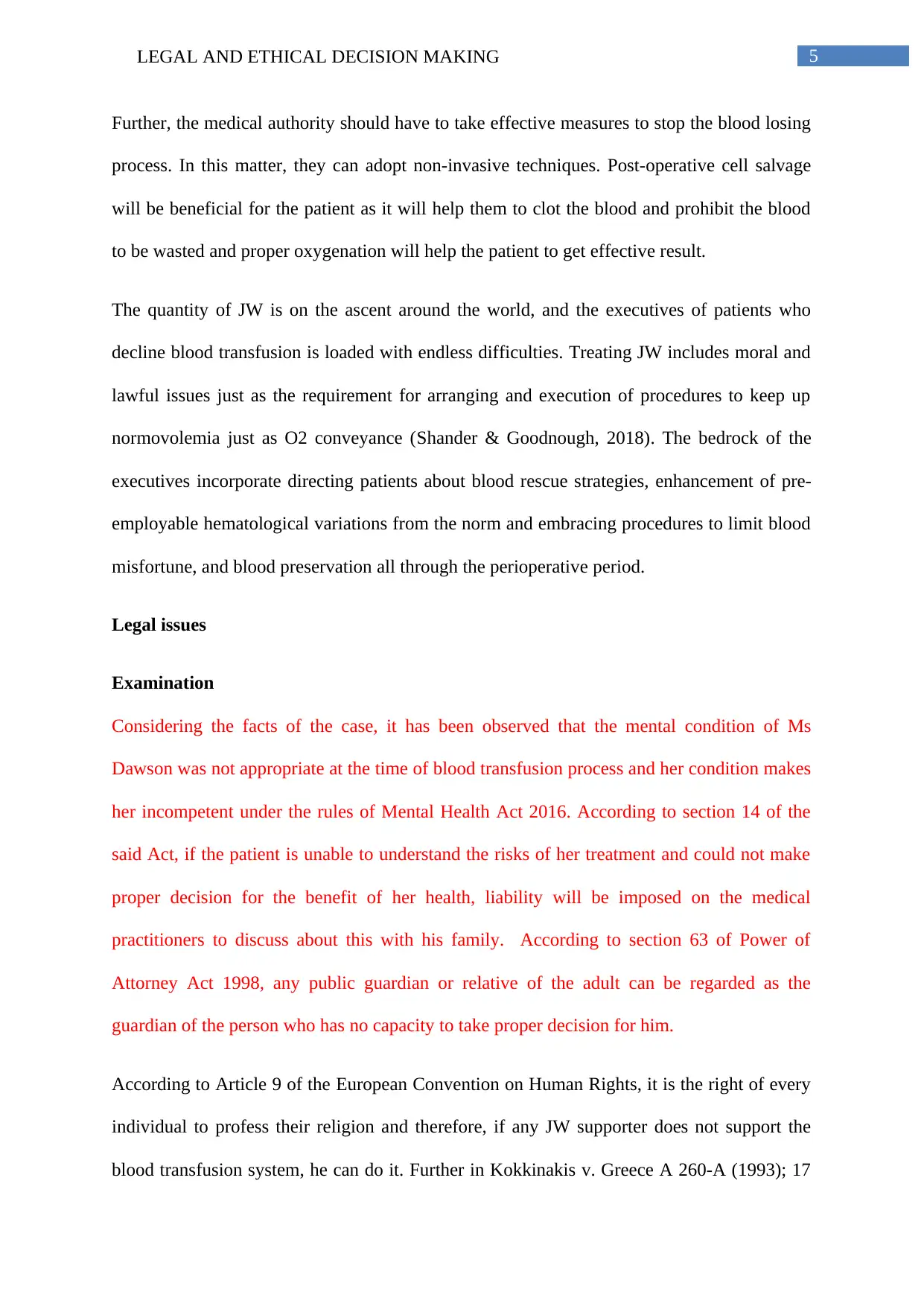
5LEGAL AND ETHICAL DECISION MAKING
Further, the medical authority should have to take effective measures to stop the blood losing
process. In this matter, they can adopt non-invasive techniques. Post-operative cell salvage
will be beneficial for the patient as it will help them to clot the blood and prohibit the blood
to be wasted and proper oxygenation will help the patient to get effective result.
The quantity of JW is on the ascent around the world, and the executives of patients who
decline blood transfusion is loaded with endless difficulties. Treating JW includes moral and
lawful issues just as the requirement for arranging and execution of procedures to keep up
normovolemia just as O2 conveyance (Shander & Goodnough, 2018). The bedrock of the
executives incorporate directing patients about blood rescue strategies, enhancement of pre-
employable hematological variations from the norm and embracing procedures to limit blood
misfortune, and blood preservation all through the perioperative period.
Legal issues
Examination
Considering the facts of the case, it has been observed that the mental condition of Ms
Dawson was not appropriate at the time of blood transfusion process and her condition makes
her incompetent under the rules of Mental Health Act 2016. According to section 14 of the
said Act, if the patient is unable to understand the risks of her treatment and could not make
proper decision for the benefit of her health, liability will be imposed on the medical
practitioners to discuss about this with his family. According to section 63 of Power of
Attorney Act 1998, any public guardian or relative of the adult can be regarded as the
guardian of the person who has no capacity to take proper decision for him.
According to Article 9 of the European Convention on Human Rights, it is the right of every
individual to profess their religion and therefore, if any JW supporter does not support the
blood transfusion system, he can do it. Further in Kokkinakis v. Greece A 260-A (1993); 17
Further, the medical authority should have to take effective measures to stop the blood losing
process. In this matter, they can adopt non-invasive techniques. Post-operative cell salvage
will be beneficial for the patient as it will help them to clot the blood and prohibit the blood
to be wasted and proper oxygenation will help the patient to get effective result.
The quantity of JW is on the ascent around the world, and the executives of patients who
decline blood transfusion is loaded with endless difficulties. Treating JW includes moral and
lawful issues just as the requirement for arranging and execution of procedures to keep up
normovolemia just as O2 conveyance (Shander & Goodnough, 2018). The bedrock of the
executives incorporate directing patients about blood rescue strategies, enhancement of pre-
employable hematological variations from the norm and embracing procedures to limit blood
misfortune, and blood preservation all through the perioperative period.
Legal issues
Examination
Considering the facts of the case, it has been observed that the mental condition of Ms
Dawson was not appropriate at the time of blood transfusion process and her condition makes
her incompetent under the rules of Mental Health Act 2016. According to section 14 of the
said Act, if the patient is unable to understand the risks of her treatment and could not make
proper decision for the benefit of her health, liability will be imposed on the medical
practitioners to discuss about this with his family. According to section 63 of Power of
Attorney Act 1998, any public guardian or relative of the adult can be regarded as the
guardian of the person who has no capacity to take proper decision for him.
According to Article 9 of the European Convention on Human Rights, it is the right of every
individual to profess their religion and therefore, if any JW supporter does not support the
blood transfusion system, he can do it. Further in Kokkinakis v. Greece A 260-A (1993); 17
⊘ This is a preview!⊘
Do you want full access?
Subscribe today to unlock all pages.

Trusted by 1+ million students worldwide
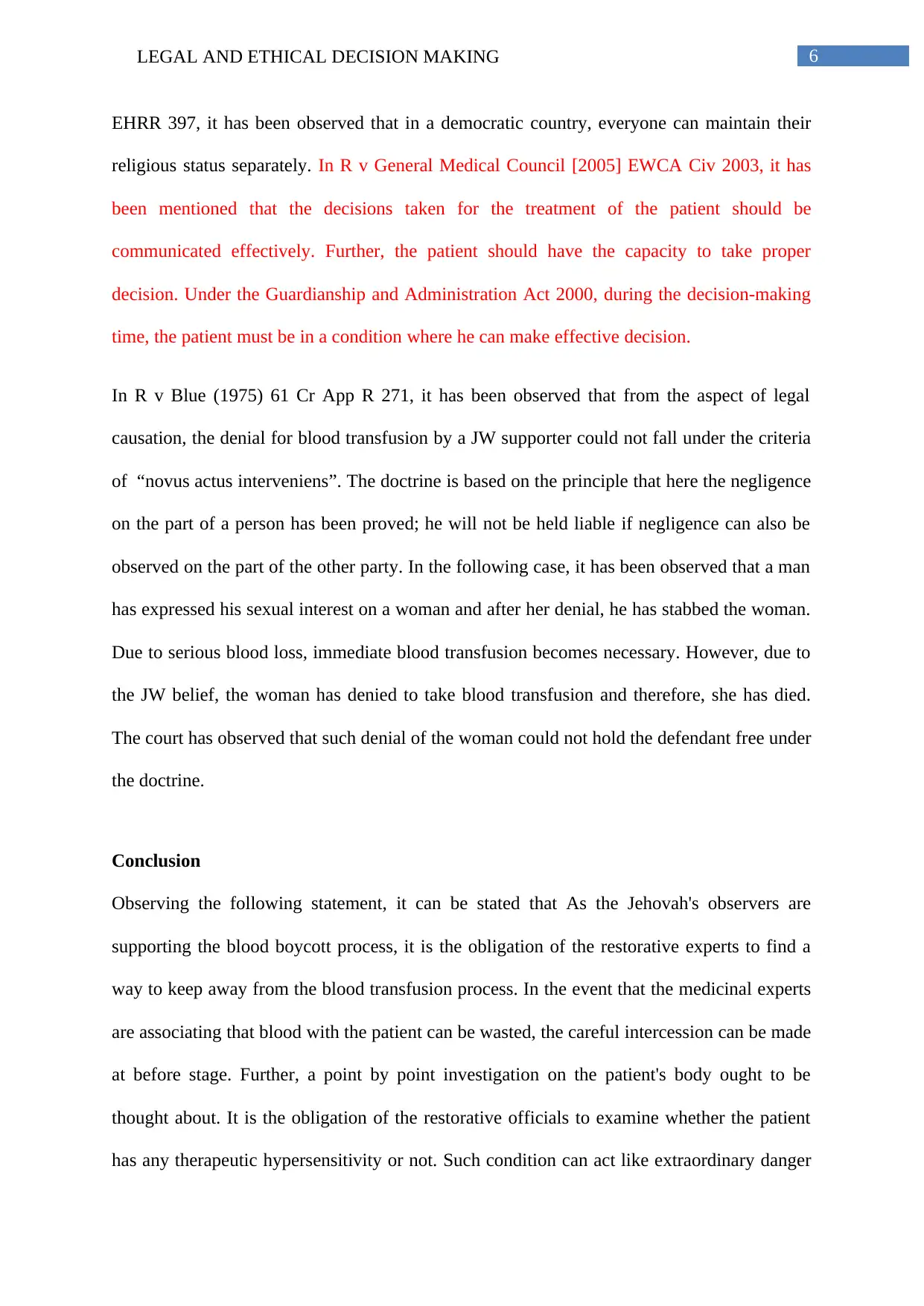
6LEGAL AND ETHICAL DECISION MAKING
EHRR 397, it has been observed that in a democratic country, everyone can maintain their
religious status separately. In R v General Medical Council [2005] EWCA Civ 2003, it has
been mentioned that the decisions taken for the treatment of the patient should be
communicated effectively. Further, the patient should have the capacity to take proper
decision. Under the Guardianship and Administration Act 2000, during the decision-making
time, the patient must be in a condition where he can make effective decision.
In R v Blue (1975) 61 Cr App R 271, it has been observed that from the aspect of legal
causation, the denial for blood transfusion by a JW supporter could not fall under the criteria
of “novus actus interveniens”. The doctrine is based on the principle that here the negligence
on the part of a person has been proved; he will not be held liable if negligence can also be
observed on the part of the other party. In the following case, it has been observed that a man
has expressed his sexual interest on a woman and after her denial, he has stabbed the woman.
Due to serious blood loss, immediate blood transfusion becomes necessary. However, due to
the JW belief, the woman has denied to take blood transfusion and therefore, she has died.
The court has observed that such denial of the woman could not hold the defendant free under
the doctrine.
Conclusion
Observing the following statement, it can be stated that As the Jehovah's observers are
supporting the blood boycott process, it is the obligation of the restorative experts to find a
way to keep away from the blood transfusion process. In the event that the medicinal experts
are associating that blood with the patient can be wasted, the careful intercession can be made
at before stage. Further, a point by point investigation on the patient's body ought to be
thought about. It is the obligation of the restorative officials to examine whether the patient
has any therapeutic hypersensitivity or not. Such condition can act like extraordinary danger
EHRR 397, it has been observed that in a democratic country, everyone can maintain their
religious status separately. In R v General Medical Council [2005] EWCA Civ 2003, it has
been mentioned that the decisions taken for the treatment of the patient should be
communicated effectively. Further, the patient should have the capacity to take proper
decision. Under the Guardianship and Administration Act 2000, during the decision-making
time, the patient must be in a condition where he can make effective decision.
In R v Blue (1975) 61 Cr App R 271, it has been observed that from the aspect of legal
causation, the denial for blood transfusion by a JW supporter could not fall under the criteria
of “novus actus interveniens”. The doctrine is based on the principle that here the negligence
on the part of a person has been proved; he will not be held liable if negligence can also be
observed on the part of the other party. In the following case, it has been observed that a man
has expressed his sexual interest on a woman and after her denial, he has stabbed the woman.
Due to serious blood loss, immediate blood transfusion becomes necessary. However, due to
the JW belief, the woman has denied to take blood transfusion and therefore, she has died.
The court has observed that such denial of the woman could not hold the defendant free under
the doctrine.
Conclusion
Observing the following statement, it can be stated that As the Jehovah's observers are
supporting the blood boycott process, it is the obligation of the restorative experts to find a
way to keep away from the blood transfusion process. In the event that the medicinal experts
are associating that blood with the patient can be wasted, the careful intercession can be made
at before stage. Further, a point by point investigation on the patient's body ought to be
thought about. It is the obligation of the restorative officials to examine whether the patient
has any therapeutic hypersensitivity or not. Such condition can act like extraordinary danger
Paraphrase This Document
Need a fresh take? Get an instant paraphrase of this document with our AI Paraphraser
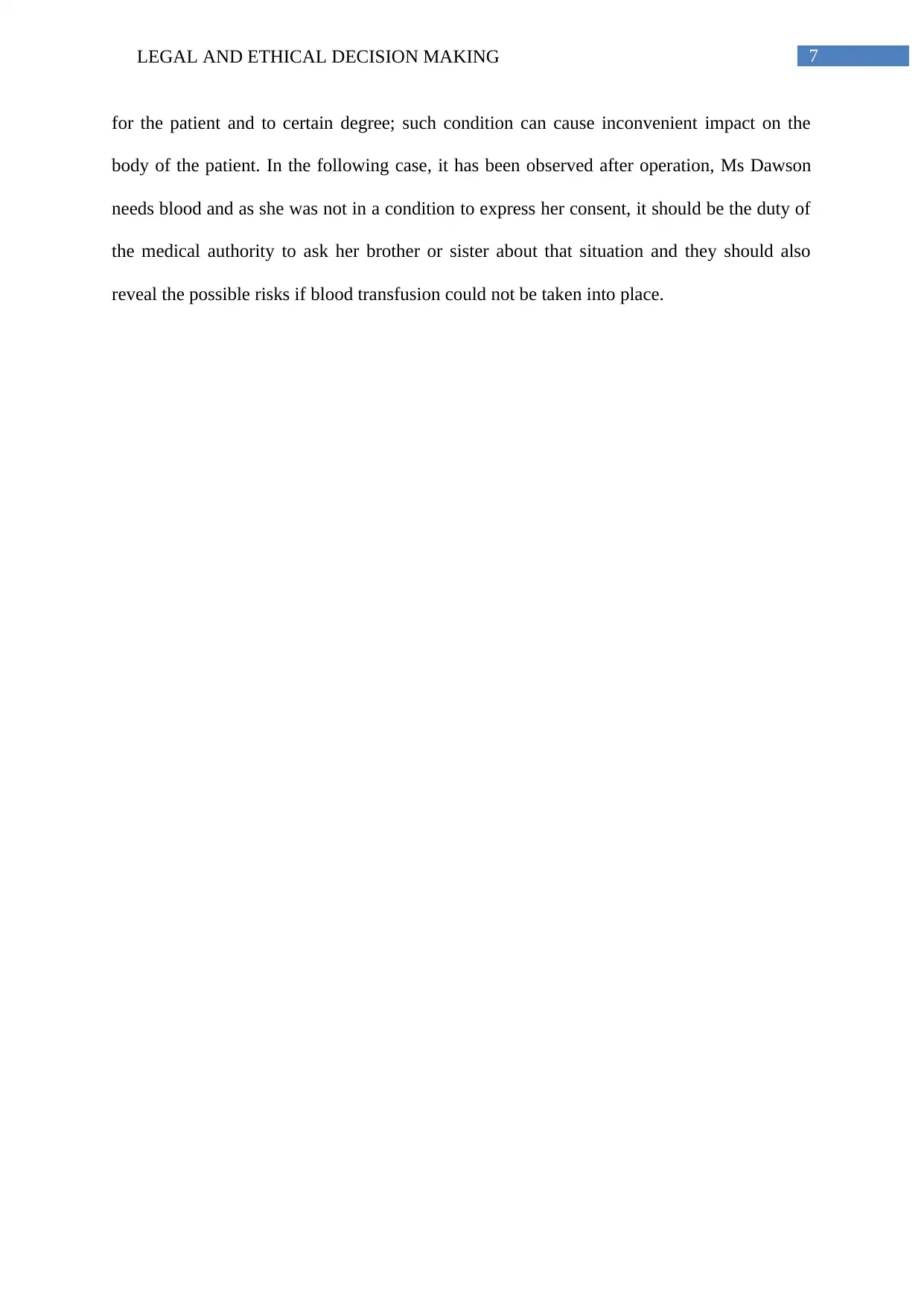
7LEGAL AND ETHICAL DECISION MAKING
for the patient and to certain degree; such condition can cause inconvenient impact on the
body of the patient. In the following case, it has been observed after operation, Ms Dawson
needs blood and as she was not in a condition to express her consent, it should be the duty of
the medical authority to ask her brother or sister about that situation and they should also
reveal the possible risks if blood transfusion could not be taken into place.
for the patient and to certain degree; such condition can cause inconvenient impact on the
body of the patient. In the following case, it has been observed after operation, Ms Dawson
needs blood and as she was not in a condition to express her consent, it should be the duty of
the medical authority to ask her brother or sister about that situation and they should also
reveal the possible risks if blood transfusion could not be taken into place.
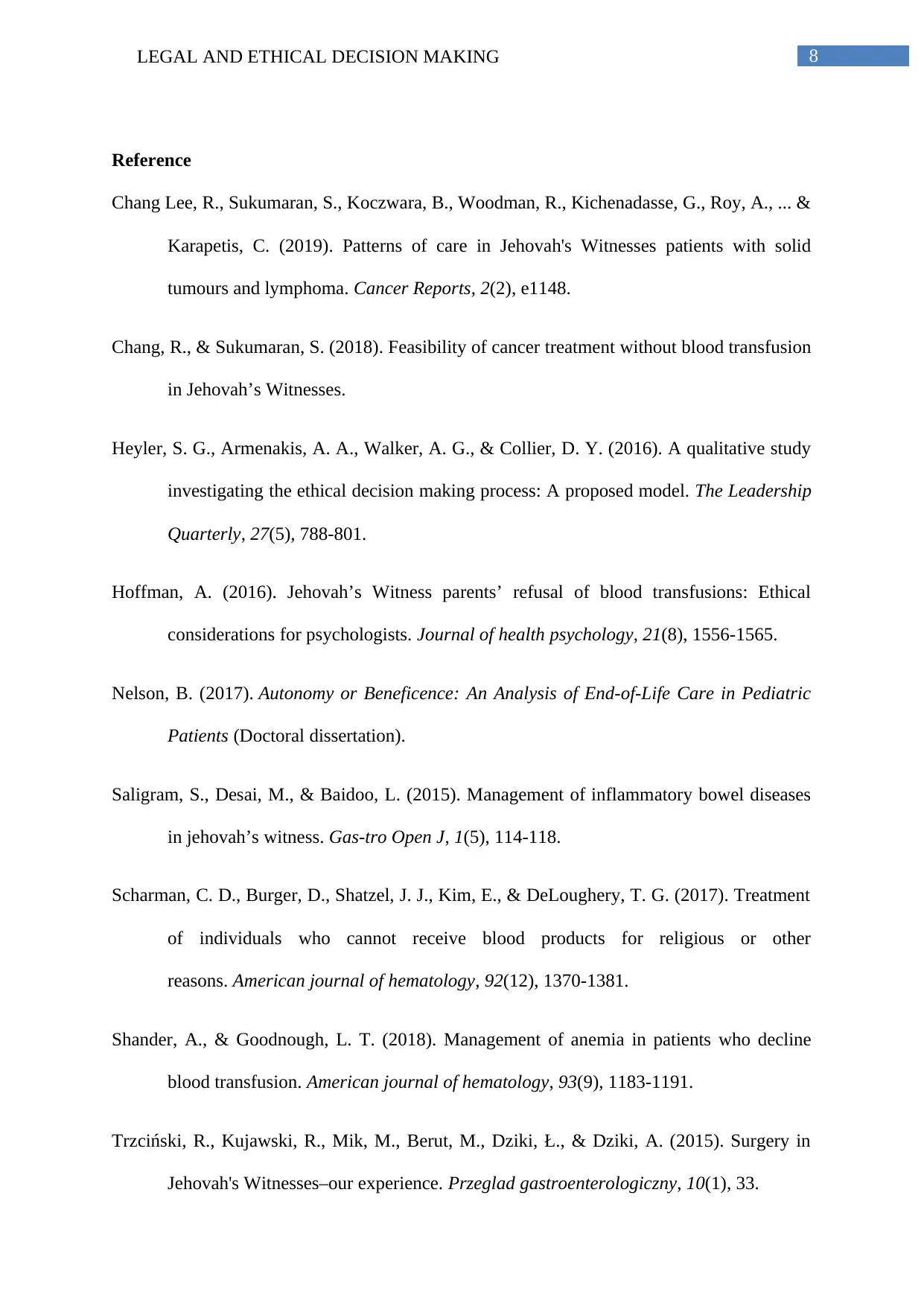
8LEGAL AND ETHICAL DECISION MAKING
Reference
Chang Lee, R., Sukumaran, S., Koczwara, B., Woodman, R., Kichenadasse, G., Roy, A., ... &
Karapetis, C. (2019). Patterns of care in Jehovah's Witnesses patients with solid
tumours and lymphoma. Cancer Reports, 2(2), e1148.
Chang, R., & Sukumaran, S. (2018). Feasibility of cancer treatment without blood transfusion
in Jehovah’s Witnesses.
Heyler, S. G., Armenakis, A. A., Walker, A. G., & Collier, D. Y. (2016). A qualitative study
investigating the ethical decision making process: A proposed model. The Leadership
Quarterly, 27(5), 788-801.
Hoffman, A. (2016). Jehovah’s Witness parents’ refusal of blood transfusions: Ethical
considerations for psychologists. Journal of health psychology, 21(8), 1556-1565.
Nelson, B. (2017). Autonomy or Beneficence: An Analysis of End-of-Life Care in Pediatric
Patients (Doctoral dissertation).
Saligram, S., Desai, M., & Baidoo, L. (2015). Management of inflammatory bowel diseases
in jehovah’s witness. Gas-tro Open J, 1(5), 114-118.
Scharman, C. D., Burger, D., Shatzel, J. J., Kim, E., & DeLoughery, T. G. (2017). Treatment
of individuals who cannot receive blood products for religious or other
reasons. American journal of hematology, 92(12), 1370-1381.
Shander, A., & Goodnough, L. T. (2018). Management of anemia in patients who decline
blood transfusion. American journal of hematology, 93(9), 1183-1191.
Trzciński, R., Kujawski, R., Mik, M., Berut, M., Dziki, Ł., & Dziki, A. (2015). Surgery in
Jehovah's Witnesses–our experience. Przeglad gastroenterologiczny, 10(1), 33.
Reference
Chang Lee, R., Sukumaran, S., Koczwara, B., Woodman, R., Kichenadasse, G., Roy, A., ... &
Karapetis, C. (2019). Patterns of care in Jehovah's Witnesses patients with solid
tumours and lymphoma. Cancer Reports, 2(2), e1148.
Chang, R., & Sukumaran, S. (2018). Feasibility of cancer treatment without blood transfusion
in Jehovah’s Witnesses.
Heyler, S. G., Armenakis, A. A., Walker, A. G., & Collier, D. Y. (2016). A qualitative study
investigating the ethical decision making process: A proposed model. The Leadership
Quarterly, 27(5), 788-801.
Hoffman, A. (2016). Jehovah’s Witness parents’ refusal of blood transfusions: Ethical
considerations for psychologists. Journal of health psychology, 21(8), 1556-1565.
Nelson, B. (2017). Autonomy or Beneficence: An Analysis of End-of-Life Care in Pediatric
Patients (Doctoral dissertation).
Saligram, S., Desai, M., & Baidoo, L. (2015). Management of inflammatory bowel diseases
in jehovah’s witness. Gas-tro Open J, 1(5), 114-118.
Scharman, C. D., Burger, D., Shatzel, J. J., Kim, E., & DeLoughery, T. G. (2017). Treatment
of individuals who cannot receive blood products for religious or other
reasons. American journal of hematology, 92(12), 1370-1381.
Shander, A., & Goodnough, L. T. (2018). Management of anemia in patients who decline
blood transfusion. American journal of hematology, 93(9), 1183-1191.
Trzciński, R., Kujawski, R., Mik, M., Berut, M., Dziki, Ł., & Dziki, A. (2015). Surgery in
Jehovah's Witnesses–our experience. Przeglad gastroenterologiczny, 10(1), 33.
⊘ This is a preview!⊘
Do you want full access?
Subscribe today to unlock all pages.

Trusted by 1+ million students worldwide
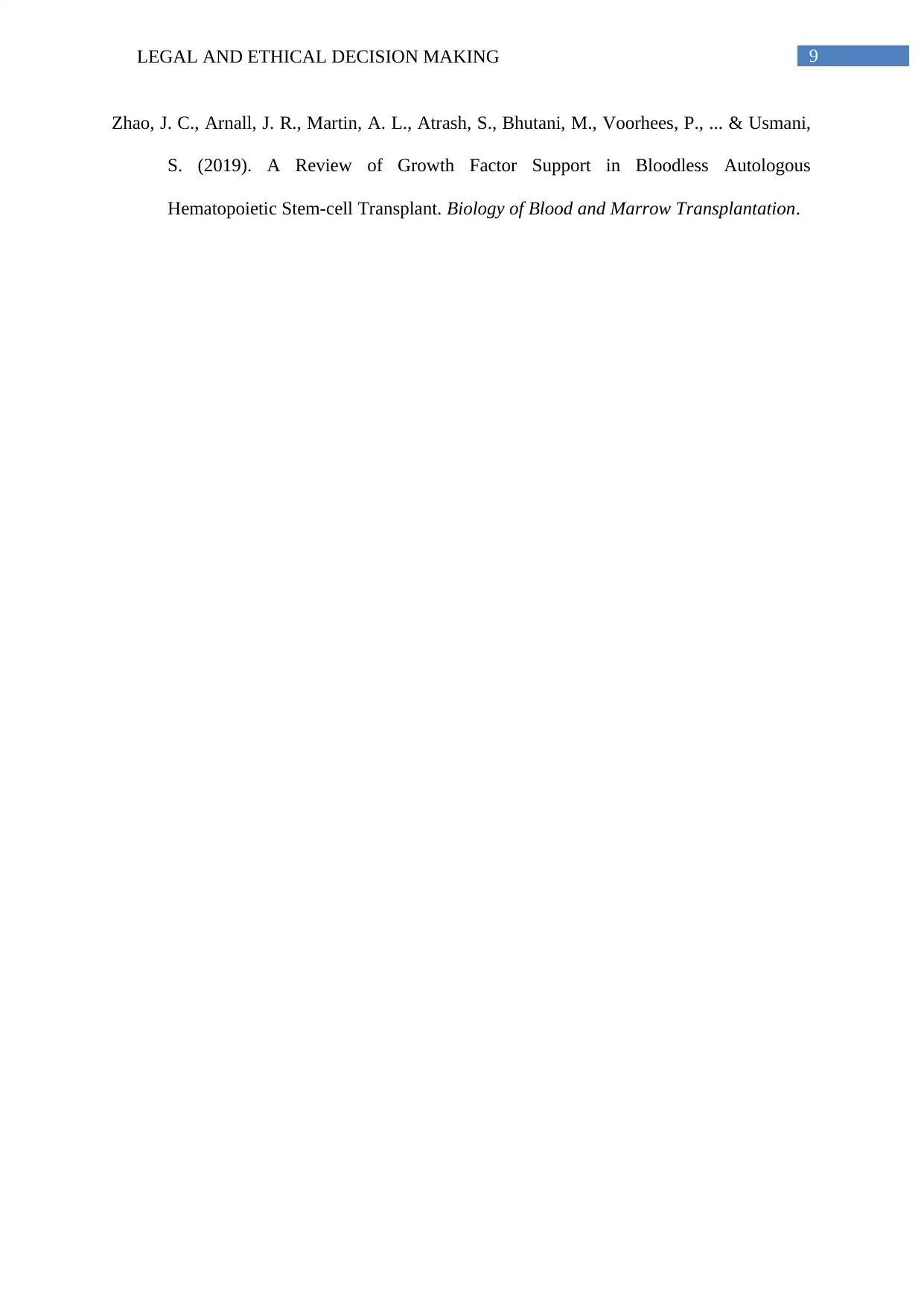
9LEGAL AND ETHICAL DECISION MAKING
Zhao, J. C., Arnall, J. R., Martin, A. L., Atrash, S., Bhutani, M., Voorhees, P., ... & Usmani,
S. (2019). A Review of Growth Factor Support in Bloodless Autologous
Hematopoietic Stem-cell Transplant. Biology of Blood and Marrow Transplantation.
Zhao, J. C., Arnall, J. R., Martin, A. L., Atrash, S., Bhutani, M., Voorhees, P., ... & Usmani,
S. (2019). A Review of Growth Factor Support in Bloodless Autologous
Hematopoietic Stem-cell Transplant. Biology of Blood and Marrow Transplantation.
Paraphrase This Document
Need a fresh take? Get an instant paraphrase of this document with our AI Paraphraser

10LEGAL AND ETHICAL DECISION MAKING
1 out of 11
Related Documents
Your All-in-One AI-Powered Toolkit for Academic Success.
+13062052269
info@desklib.com
Available 24*7 on WhatsApp / Email
![[object Object]](/_next/static/media/star-bottom.7253800d.svg)
Unlock your academic potential
Copyright © 2020–2026 A2Z Services. All Rights Reserved. Developed and managed by ZUCOL.





